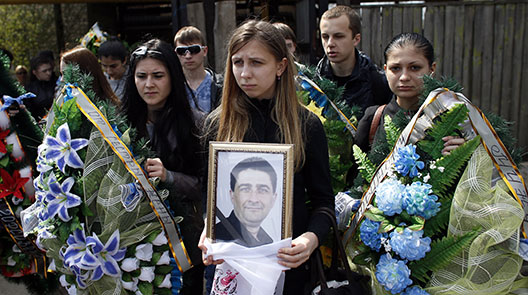
An Execution-Style Killing Deepens the Brutality in Ukraine’s Conflict
Until last week Volodymyr Rybak, 42, was a municipal councilor in Horlivka, a coal-mining city 20 miles northeast of Donetsk. Rybak opposed the takeover of his city’s government by the gunmen who have proclaimed a separatist Donetsk People’s Republic in southeastern Ukraine. On April 17 he and some friends got into a shoving match with the gunmen when he tried to enter city hall. At one point, Rybak tried to remove the separatists’ flag hung from outside the office building.
As with much of the violence in Donetsk province, locals recorded the scene on video. “You will take down that flag over my dead body,” one man yells at Rybak. Other men, masked, and wearing leather jackets or a camouflage uniform, manhandle Rybak in video, posted on the local news site Gorlovka.ua.
On a city street later that day, more masked men caught up with Rybak, a member of the Batkivshchyna (Fatherland) party, which is prominent in the interim government in Kyiv. The men forced Rybak into a car, Ukraine’s Interior Ministry says, and he was next found dead 40 miles to the north, near the separatist stronghold of Slaviansk. He had been stabbed, his body left near the bank of the Torets River, the independent Kyiv Post reported.
The deaths of Rybak and a still-unidentified man whose body was found nearby are the latest signs of a “dirty war” of beatings, kidnappings, and now killings by the masked gunmen of Donetsk province. Ukrainian intelligence chief Valentyn Nalyvaichenko said this week the hundreds of gunmen are being guided by as many as 100 officers from Russia’s military intelligence unit, the GRU, and Russian special forces troops in Donetsk.
Volodymyr Rybak’s killing is perhaps the clearest single demonstration of the gunmen’s readiness to conduct the half-hidden, mafia-style violence for which “dirty war” became a shorthand under the Argentine and Chilean juntas of the 1970s. But evidence comes from many directions – multiple reports by independent journalists in Donetsk, video recordings by local residents of violently-inclined gunmen, and accounts by Nalyvaichenko’s agency, the Security Service of Ukraine (SBU).
The SBU this week published summaries of telephone conversations it says it intercepted between GRU officers and the self-proclaimed, separatist mayor of Slaviansk, Vyacheslav Ponomaryov. The SBU quotes GRU Lieutenant Colonel Igor Bezler as telling Ponomaryov that Rybak is to be “neutralized.” In later conversations, the SBU quotes GRU Colonel Igor Strelkov, which it calls the main organizer of the Donetsk uprising, as ordering that Rybak be brought to meet him. Finally, Strelkov orders Ponomaryov to dispose of Rybak’s body. “Slava, get rid of him as soon as possible, he’s lying here and stinking” says Strelkov, according to the transcript. “The corpse,” answers Ponomaryov. “Yes, Yes, right away, as soon as I finish dealing with the journalists, I’ll take care of it.”
Slaviansk, under Ponomaryov and Strelkov, is the center of Donetsk’s dirty war, in which 16 people – including journalists and at least three Slaviansk officials who opposed the gunmen – are known to have been taken hostage, according to a count this week by the Kyiv Post. Some have since been released, others have been confirmed by Ponomaryov to be in his forces’ custody – and several have disappeared, with no word on their fates.
On April 22, the Slaviansk gunmen detained US journalist and documentary filmmaker Simon Ostrovsky, who has been covering the Ukraine crisis for Vice News. Ponomaryov said his men were investigating Ostrovsky for allegedly working with the Ukrainian right-wing nationalist group the Right Sector. Ponomaryov told Russia’s RIA-Novosti news agency he would trade Ostrovsky for Pavel Gubarev, the self-proclaimed separatist governor of Donetsk province, who was arrested by Ukrainian authorities in March.
Journalists in Slaviansk reported this afternoon that the militants freed Ostrovsky. Ponomaryov’s forces in the town say they continue to detain other journalists, and the flamboyant, platinum-haired Slaviansk mayor, Nelly Shtepa, who turned critical of the gunmen before they detained her earlier this month.
Irena Chalupa covers Ukraine and Eastern Europe for the Atlantic Council.
Image: Relatives of Volodymyr Rybak, a city councilor in Horlivka, carry his picture at his funeral April 24, after he was abducted and killed in Ukraine’s Donetsk province. The Ukrainian state security agency said Russian military officers directing separatist uprisings in Donetsk had ordered Rybak’s killing after he opposed a separatist takeover in Horlivka. REUTERS/Marko Djurica
